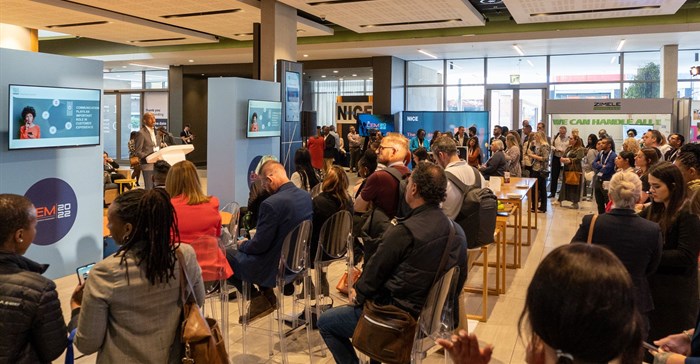#CEMAfrica2023: AI's impact on CX takes centre stage

Starting today and running for two days, in Cape Town, CEM Africa, the region's event dedicated to customer experience excellence, is hosting a series of insightful discussions, workshops, and presentations, with many focused on AI's profound impact on customer engagement, personalisation, and the delicate balance between technology and the human touch.
Relegated to the CX sidelines
Long relegated to the sidelines of CX discussions, AI has now taken the spotlight as the foremost trend reshaping the CX landscape.
With its ability to analyse vast amounts of data, anticipate customer needs, and deliver hyper-personalised experiences, AI is no longer a futuristic concept – it's the driving force behind innovation in the present.
Zoom’s AI Chatbot
Today’s consumers crave personalised experiences and as many as 72% want immediate service.
Zoom launched their Zoom contact centre in 2022 to meet its customers where they are across email, chat, voice, and video. To complement its omnichannel CCaaS offering, it acquired the conversational AI platform, Solvvy, and began developing Zoom virtual agent (ZVA), affectionately known as “Zoe,” for customer support.
As part of Zoe’s testing and workflow development, they uncovered new insight into the customer journey that was missing from their previous chatbot.
Thanks to ZVA’s advanced metrics and robust analytics, the team could see where and how a customer finds help and redesign our workflows to move them toward a quicker resolution.
“We’re able to understand the full user journey during the chatbot interaction, allowing us to tighten up our workflows and use the metrics from our virtual agent to make alterations when needed,” says Lawrence Barreca, Zoom automation content specialist.
The Metropolitan Health Group unpacks personalisation vs AI
The Group’s goals for the customer experience over the next year are to leverage artificial intelligence (AI) to enable personalisation, seamless omnichannel experiences, continuous improvement, proactive issue resolution, empathy-driven interactions, and measuring and optimising customer empathy.
In addition to leveraging AI, another important aspect of its goals for optimising CX in the coming year is to incorporate behavioural science principles into its strategies. By understanding human behaviour and decision-making processes, it can create more effective and satisfying experiences for our customers.
By harnessing the power of AI, integrating behavioural science principles into its CX optimisation efforts, and focusing on empathy, it aims to enhance engagement, satisfaction and, ultimately, build stronger and more meaningful relationships with its customers.
ServiceNow and the human touch
Currently, there is an urgent need for human-centred technology.
All the AI and chatbots in the world are not going to deliver the personal touch that today’s consumers are seeking.
But by combining human ingenuity and empathy with the efficiency and speed of AI, businesses can get a step closer to perfect CX.
An AI solution is a better option for monitoring customer feedback across surveys, emails, voice, chat, social media, review sites, and WhatsApp. Natural-language understanding has become so advanced that it can distill the content of human words into meaningful insights that include the sentiment and intention behind the words.
The implications for such an approach are far-reaching for the human side of the equation.
Not only can human agents react in real-time to actionable information gleaned by AI systems, but decision-makers can adjust policy, or even their approaches to making policy, by analysing insights at scale.
In other words, one complaint can be handled through real-time insights, but a spike in complaints can be studied after the fact to determine a root cause, leading to valuable adjustments to long-term strategies.
Rogerwilco and the role of AI and digitisation
Globally, customer support is leaning hard into large language models like OpenAI to improve efficiency - by 2030 businesses will spend more than $58bn on customer service software.
Clint Payne sounds a warning note maintaining that as businesses pursue digital leadership, they can be distracted by trends like AI and machine learning.
“We’re tempted to push these technologies out to customers to solve business problems like efficiency, cost and volume, just to re-create a digital version of the IVR switchboards we all hated in the late 90s”.
His advice is to: “Rather, first deploy AI and machine learning to backend (non customer facing) environments where it can empower our people and automate processes.”
ooba’s d’Hotman echoes this, believing that digitisation can lead to dehumanisation and loss of empathy.
“LLM driven chatbots are the next iteration of this which will enhance the experience of users but unless they genuinely connect with and are able to understand what the consumer is trying to achieve they run the risk of being no more than a dressed up contact form that gets no response.
“My view is that organisations should be thinking about how digital can be used as an enhancer of human performance and not a replacement for it – in some ways the question could be what does the “post-digital” experience look like and how could we move beyond the coded path optimisation which is prevalent today.”
Despite generating acres of newsprint and dominating media headlines in recent months, locally, the jury remains undecided on the role of ChatGPT as a customer service channel or how consumers may use this technology in the future.
“Only 15% of our consumer panel had used it and many, just under half (49%) had never heard of it. Going the extra mile to provide support to our customers is never a fight in the boardroom - it is a non-negotiable.”
CEM Africa is examining the way organisations approach customer experience by highlighting AI as a pivotal enabler of personalised, efficient, and impactful interactions.





































